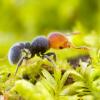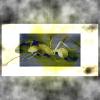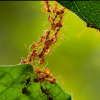- Formiculture.com
- Forums
- Gallery
- Members
- Member Map
- Chat

Don’t make the same mistake I did.
Started By
jgoogz
, Mar 9 2021 11:00 AM
9 replies to this topic
#1
 Offline
-
Posted March 9 2021 - 11:00 AM
Offline
-
Posted March 9 2021 - 11:00 AM
Don’t use honey.
It’s killed too many of my ants for me to stay quiet.
I’ve lost an awesome camp queen who just had her first worker, and a half of population of my Pogonomyrmex.
I’ve seen people agonize on what is taking out their colonies, all with the same symptoms: Some workers outside the nest slowly losing control of their bodies.
I can’t speak for all honey, but I can warn you to know what you’re giving them. Some honey may be a death sentence to your colony. Sugar water is an easy alternative.
If this is old news for you, I’m glad- but hopefully I help even just one keeper this spring.
Good luck, have fun.
Sent from my iPhone using Tapatalk
It’s killed too many of my ants for me to stay quiet.
I’ve lost an awesome camp queen who just had her first worker, and a half of population of my Pogonomyrmex.
I’ve seen people agonize on what is taking out their colonies, all with the same symptoms: Some workers outside the nest slowly losing control of their bodies.
I can’t speak for all honey, but I can warn you to know what you’re giving them. Some honey may be a death sentence to your colony. Sugar water is an easy alternative.
If this is old news for you, I’m glad- but hopefully I help even just one keeper this spring.
Good luck, have fun.
Sent from my iPhone using Tapatalk
- ZTYguy and Chickalo like this
Whatever you are, be a good one.
#2
 Offline
-
Posted March 9 2021 - 11:34 AM
Offline
-
Posted March 9 2021 - 11:34 AM
Just make sure that your honey hasn't been treated with pesticides, or other dangerous chemicals. I've given my ants honey and they took it just fine, although You do need to dilute it to make it less sticky.
Ants I am keeping:
none for now, planning on being more active this year
#3
 Offline
-
Posted March 9 2021 - 11:40 AM
Offline
-
Posted March 9 2021 - 11:40 AM
I've had luck using organic honey, and I think it is generally safe. The issue is, though, that beekeepers can't control what flowers bees are feeding from. You can't be 100% sure that the bees didn't come into contact with pesticides, even if it's labeled organic.
Order some byFormica liquid feeders and byFormica Sunburst. Your life as an ant-keeper will be so much easier.
- jgoogz and CheetoLord02 like this
"The ants are a people not strong, yet they prepare their meat in the summer." Prov. 30:25
Keep ordinary ants in extraordinary ways.
Keep ordinary ants in extraordinary ways.
#4
 Offline
-
Posted March 9 2021 - 11:47 AM
Offline
-
Posted March 9 2021 - 11:47 AM
Good suggestion, thank you brother man.
Sent from my iPhone using Tapatalk
Sent from my iPhone using Tapatalk
Whatever you are, be a good one.
#5
 Offline
-
Posted March 9 2021 - 11:48 AM
Offline
-
Posted March 9 2021 - 11:48 AM
I use honey and my ants love it. You can use it if you put a little drop on a piece of paper towel or tin foil.
#6
 Offline
-
Posted March 9 2021 - 11:51 AM
Offline
-
Posted March 9 2021 - 11:51 AM
For the most part, I wouldn't do drops of honey, it's too thick and the ants can drown. Generally, spreading a thin layer of honey across tin foil or wax paper works well since it reduces the chance of your ants drowning (unless your ants are total dunces and somehow manage to drown, anyways)
- Canadant and ConcordAntman like this
シグナチャーです。예.
#7
 Offline
-
Posted March 9 2021 - 11:51 AM
Offline
-
Posted March 9 2021 - 11:51 AM
I use honey and my ants love it. You can use it if you put a little drop on a piece of paper towel or tin foil.
It's more about where it comes from and if it has been treated with pesticides.
- jgoogz likes this
#8
 Offline
-
Posted March 9 2021 - 11:54 AM
Offline
-
Posted March 9 2021 - 11:54 AM
I do think honey, when can be absolutely verified pure, is a great food source.
Might be worth checking some on test ants...
It is only a warning, because I’ve seen it effect not just me.
Sent from my iPhone using Tapatalk
Might be worth checking some on test ants...
It is only a warning, because I’ve seen it effect not just me.
Sent from my iPhone using Tapatalk
- Chickalo likes this
Whatever you are, be a good one.
#9
 Offline
-
Posted March 9 2021 - 12:53 PM
Offline
-
Posted March 9 2021 - 12:53 PM
I read too many accounts of ants dying of honey. Plus, look up honey laundering - it can be hard to know what's really in honey. I have, however, ordered honey from THA - if others have used the same batch safely, I'll trust it to be reasonably safe. Nonetheless, I usually stick with Sunburst.
One weird random factoid is that with honey bees, their diet of natural pollen and honey may contribute to worker sterility (honey bee queens only get royal jelly). Thankfully doesn't seem to affect ants, though.
Edited by OhNoNotAgain, March 9 2021 - 12:53 PM.
- jgoogz and Chickalo like this
Formiculture Journals::
Veromessor pergandei, andrei; Novomessor cockerelli
Camponotus fragilis; also separate journal: Camponotus sansabeanus (inactive), vicinus, laevigatus/quercicola
Liometopum occidentale; Prenolepis imparis; Myrmecocystus mexicanus (inactive)
Pogonomyrmex subnitidus and californicus (inactive)
Tetramorium sp.
Termites: Zootermopsis angusticollis
Isopods: A. gestroi, granulatum, kluugi, maculatum, vulgare; C. murina; P. hoffmannseggi, P. haasi, P. ornatus; V. parvus
Spoods: Phidippus sp.
#10
 Offline
-
Posted March 11 2021 - 9:18 PM
Offline
-
Posted March 11 2021 - 9:18 PM
The orgamic honey is suck a great food source, is because it contains a lot of the nutrients that ants need, because as we know, bee's store and feed their larvae honey.
1 user(s) are reading this topic
0 members, 1 guests, 0 anonymous users





















